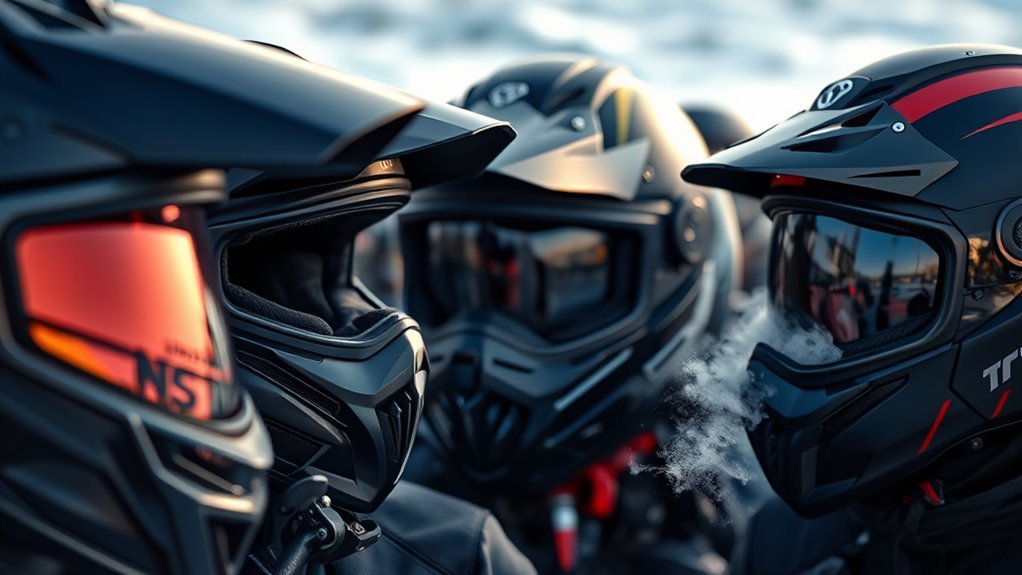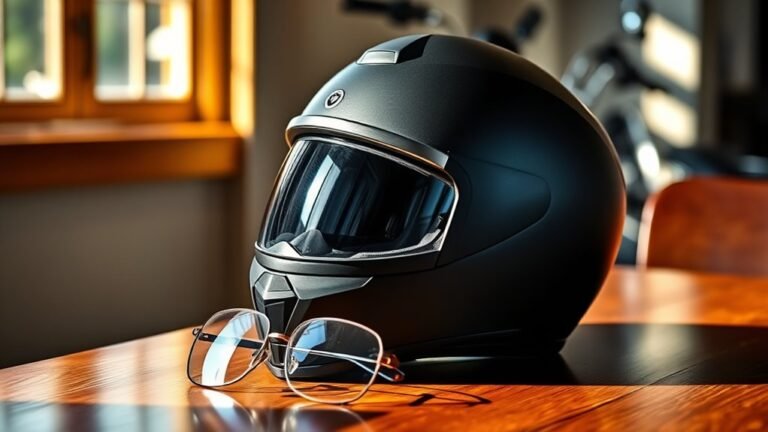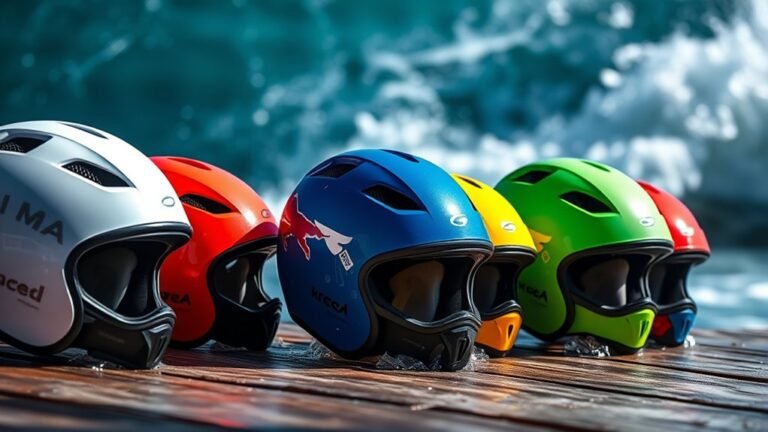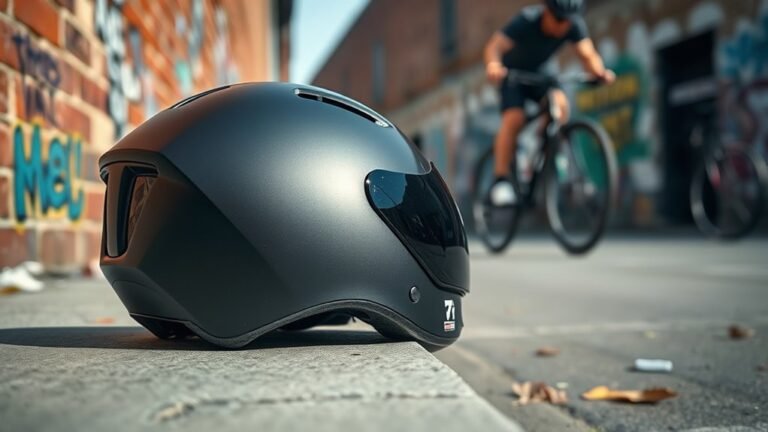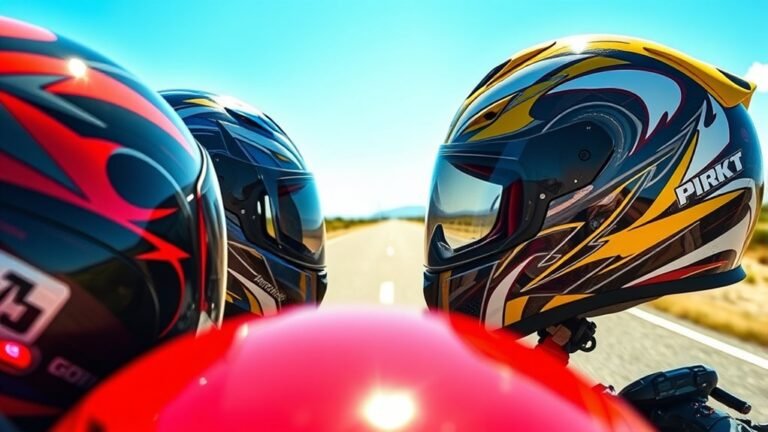Best Motorcycle Helmets for Cold Weather
When it comes to the best motorcycle helmets for cold weather, full-face helmets offer maximum protection and warmth, while modular helmets provide versatility. Open-face helmets may seem appealing for airflow but can expose you to harsh winds. Heated helmets are the ultimate choice for comfort in chilly conditions. Key features to evaluate include insulation, fit, fog resistance, and safety. To find the perfect helmet for your needs, you’ll want to explore more about these options.
Full-Face Helmets for Maximum Protection and Warmth
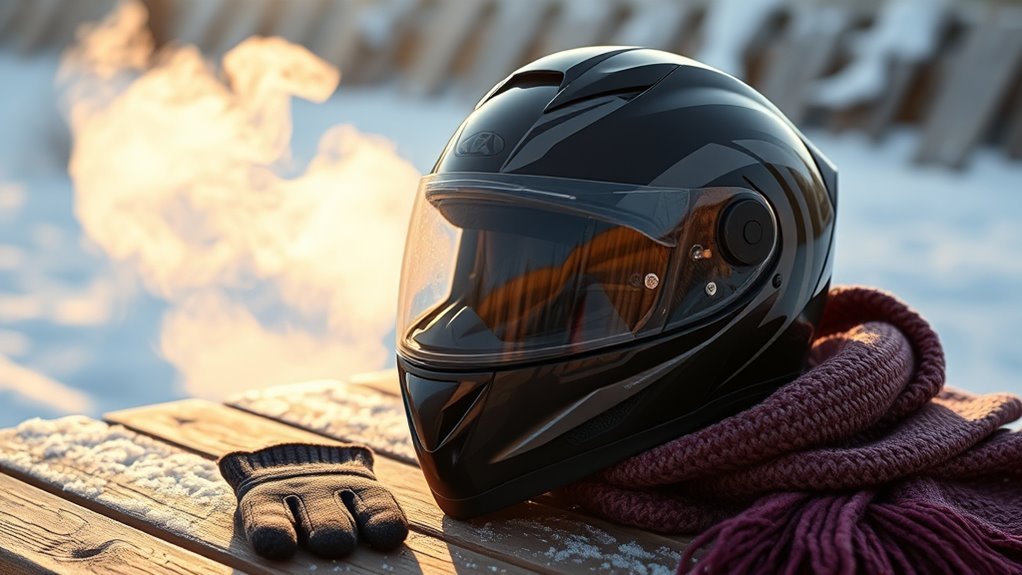
When you’re riding in cold weather, full-face helmets offer unparalleled protection and warmth. These helmets feature a thorough design that shields your entire head from harsh elements. The inclusion of thermal liners enhances insulation, keeping your head cozy despite frigid temperatures. This additional layer traps heat while allowing for breathability, ensuring comfort on long rides.
Moreover, visor insulation is essential for minimizing fogging and maintaining clear visibility. A well-constructed visor prevents cold air from seeping in, which can distract you while you’re steering. With a full-face helmet, you not only enjoy superior protection against impacts but also the freedom to ride confidently in chilly conditions. Embrace the ride knowing you’re equipped for whatever the weather throws your way.
Modular Helmets: Versatility Meets Comfort
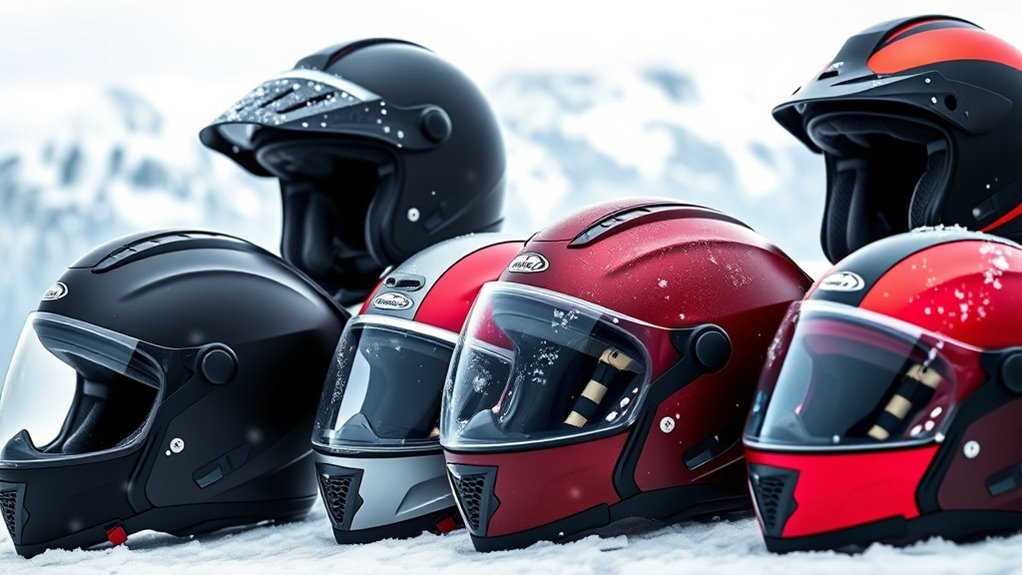
Modular helmets offer the perfect blend of versatility and comfort for riders facing cold weather challenges. With their unique modular designs, these helmets provide the flexibility to adapt to various riding conditions while ensuring warmth and protection. You’ll appreciate features that enhance your riding experience:
- Flip-up chin bar for easy ventilation without removing the helmet.
- Enhanced insulation to keep you warm during chilly rides.
- Comfort features like plush padding and moisture-wicking liners for extended wear.
Whether you’re commuting or starting on long journeys, modular helmets cater to your freedom-seeking spirit. You can easily shift from full-face protection to an open-face option, giving you the best of both worlds while braving the elements.
Open-Face Helmets: Pros and Cons in Cold Weather
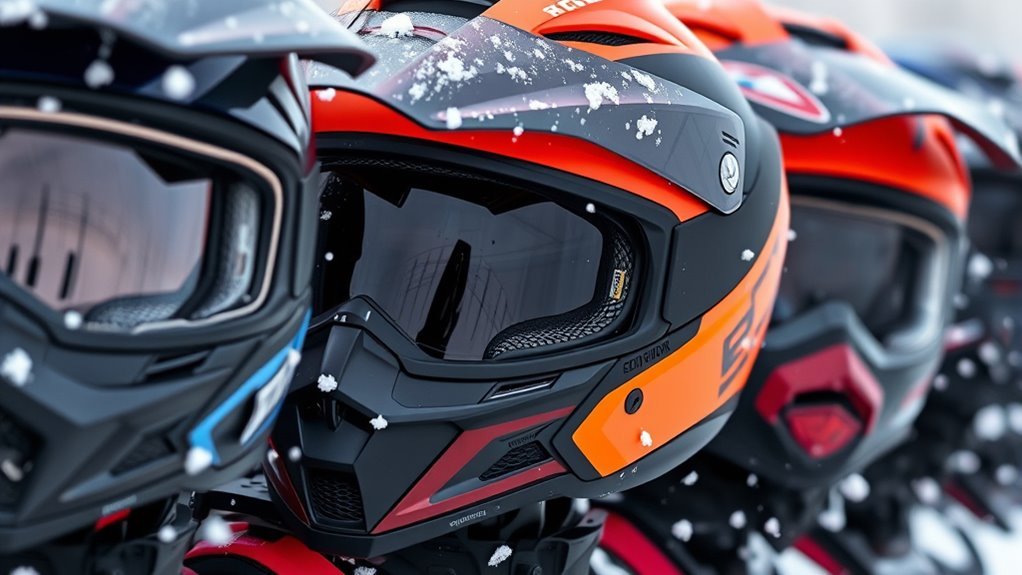
While modular helmets offer versatility, open-face helmets present a different set of advantages and challenges for cold weather riding. One of the main open face advantages is the increased airflow, which can help keep you cool on warmer days. However, this feature becomes a disadvantage in cold weather, exposing your face to harsh winds and dropping temperatures. The lack of a full shield can lead to discomfort and potential frostbite on your face, especially during longer rides. Additionally, open-face helmets don’t provide the same level of insulation as closed options. If you value freedom and visibility, an open-face helmet might appeal to you, but you’ll need to weigh these open face disadvantages against your comfort and safety in colder conditions.
Heated Helmets: The Ultimate Solution for Cold Rides
If you’re tackling cold rides, heated helmets could be your best ally. These helmets offer warmth without sacrificing safety, featuring advanced materials and technology. Let’s explore the benefits, top models on the market, and essential safety features to contemplate.
Benefits of Heated Helmets
When temperatures plummet, heated helmets emerge as essential gear for riders who refuse to let the cold weather hinder their passion for motorcycling. These helmets utilize advanced heated technology, providing you with warmth during your winter riding adventures. Here are some key benefits:
- Enhanced Comfort: Stay cozy, allowing you to focus on the ride instead of battling the cold.
- Improved Safety: A warm head enhances your alertness and reaction time, vital for safe riding in winter conditions.
- Extended Riding Time: With heated helmets, you can enjoy longer rides without the discomfort of cold weather.
Investing in a heated helmet means embracing the freedom of the open road, regardless of what winter throws your way. Don’t let the chill ground your spirit; ride with confidence.
Top Heated Models
For those brave enough to ride in the cold, choosing the right heated helmet can make all the difference. The best models on the market feature heated visors that prevent fogging and guarantee clear visibility during chilly rides. Look for helmets equipped with advanced thermal liners that provide ideal insulation while distributing heat evenly. Brands like Schuberth and Harley-Davidson offer exceptional heated helmets designed for comfort and performance, incorporating smart technology for easy temperature adjustments. These models not only keep your head warm but also enhance your overall riding experience by allowing you to focus on the open road. With the right heated helmet, you can embrace the freedom of riding, regardless of the temperature.
Safety Features Consideration
While heated helmets provide essential warmth during cold rides, their safety features are equally crucial. You want to verify that your helmet not only keeps you cozy but also protects you effectively. When considering heated helmets, pay attention to the following safety features:
- Safety Ratings: Look for helmets that meet or exceed established safety standards.
- Impact Resistance: Confirm the helmet is designed with materials that absorb shocks and reduce injury risk.
- Visibility: Consider models with reflective graphics or bright colors for better visibility on the road.
Choosing a heated helmet with robust safety ratings and impressive impact resistance means you can ride confidently, knowing you’re prepared for the challenges of both cold weather and unexpected situations. Your freedom on the road deserves nothing less.
Key Features to Look for in Cold Weather Helmets
As temperatures drop, selecting the right motorcycle helmet becomes essential for maintaining comfort and safety during cold weather rides. Look for helmets that offer effective cold weather insulation, ensuring warmth without excessive bulk. A snug fit is vital; it helps minimize heat loss while providing protection. Additionally, consider helmets equipped with visor fogging solutions, such as anti-fog coatings or ventilation systems that reduce moisture buildup. These features enhance visibility, allowing you to focus on the road ahead. Finally, opt for helmets with removable liners for easy cleaning and maintenance, as this will help keep your gear fresh throughout the riding season. By prioritizing these key features, you can enjoy your rides without compromising warmth or safety.
Top Brands Known for Cold Weather Motorcycle Helmets
When it comes to cold weather motorcycle helmets, several brands stand out for their commitment to quality and performance. These brands prioritize durable helmet materials and innovative designs, ensuring you stay warm and protected on the road.
- Arai: Known for superior fit and comfort, Arai helmets often feature advanced insulation techniques.
- Schuberth: This brand excels in wind noise reduction, making long rides in cold weather more enjoyable.
- Bell: Bell helmets offer a range of options with thermal liners, perfect for battling chilly conditions.
Choosing a helmet from these trusted brands can enhance your cold weather riding experience, letting you embrace the freedom of the open road without compromising safety or comfort.
Frequently Asked Questions
How Do I Choose the Right Size for a Cold Weather Helmet?
Choosing the right size for a cold weather helmet is as essential as finding the perfect key to release your freedom. First, take a size measurement of your head, just above your eyebrows and around the largest part. Once you have that, refer to the helmet manufacturer’s sizing chart to guarantee a snug fit. A properly fitted helmet should feel secure without causing discomfort, allowing you to ride through the chill with confidence and ease.
Are There Any Specific Safety Certifications for Cold Weather Helmets?
Yes, there are specific safety certifications for cold weather helmets. When choosing one, look for helmets that meet safety standards like DOT, ECE, or Snell. These certifications guarantee the helmet provides adequate impact protection. Additionally, consider helmet features such as insulation and ventilation, which are essential for comfort in cold conditions. A well-certified helmet not only protects your head but also enhances your riding experience by keeping you warm and focused on the road.
Can I Wear Glasses With a Cold Weather Motorcycle Helmet?
Absolutely, you can wear glasses with a cold weather motorcycle helmet! Many helmets come equipped with features that enhance glasses compatibility, ensuring a snug yet comfortable fit. Look for models with wider eye openings or removable padding, which can help accommodate your eyewear without compromising safety or comfort. So, whether you’re chasing the open road or braving chilly winds, rest assured your vision won’t be clouded by discomfort. Enjoy your ride!
How Should I Clean and Maintain My Cold Weather Helmet?
To clean and maintain your cold weather helmet, start with gentle cleaning techniques. Use a soft cloth and mild soap for the exterior; avoid harsh chemicals. For the visor, use a specific helmet cleaner to prevent scratches. Regularly check the padding for moisture and odors—washing removable liners is key. Maintenance tips include storing it in a cool, dry place and inspecting for any wear or damage before each ride.
What Is the Average Lifespan of a Cold Weather Motorcycle Helmet?
The average lifespan of a cold weather motorcycle helmet is about five to seven years, though this can vary based on helmet materials and how often you ride. Some helmets, made from advanced composites, may last longer. Always check the temperature ratings, as extreme conditions can accelerate wear. Regular maintenance can extend their life, but if you notice any signs of damage, it’s best to replace it to guarantee your safety on the road.
